Ellen Arkbro & Johan Graden I Get Along Without You Very Well LP (Thrill Jockey)
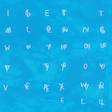 Ellen Arkbro’s Chords has been one of my go-to soothing drone records since it came out back in 2019, a richly resonant field of softly shifting sound. Naturally I was curious about her new collaboration with pianist Johan Graden, but I sure wasn’t expecting her to sing! What a nice surprise to learn that her talents extend beyond one mode of musicianship; it’s as if I discovered that Omar S was actually a sick metal guitarist or something. And for as much as I’ve enjoyed Chords, I’m loving I Get Along Without You Very Well even more. It’s really its own beast, some sort of cushiony, guitar-less, slow-core emo. Sustained woodwinds provide the deep melodic backing to Arkbro’s surprisingly indie vocals, hers an expressive delivery somewhere between The Cardigans and Sigur Rós. Graden’s synths and pianos are precise and enveloping, and alongside the patient drumming of Konrad Agnas, it often feels like The Necks with a pro-gear indie grandeur, the sort of act you’d expect Radiohead to choose as an opener and blow away their audience with. Plus, it’s simply cooler than any “indie”-filed music I’ve recently heard, reaching out into the world of drone but insisting on potent songs as their vehicle. It seems obvious that having an advanced CV in drone would greatly benefit forays into other forms of music, but Arkbro and Graden demonstrate it with casual grace and understated refinement here.
Ellen Arkbro’s Chords has been one of my go-to soothing drone records since it came out back in 2019, a richly resonant field of softly shifting sound. Naturally I was curious about her new collaboration with pianist Johan Graden, but I sure wasn’t expecting her to sing! What a nice surprise to learn that her talents extend beyond one mode of musicianship; it’s as if I discovered that Omar S was actually a sick metal guitarist or something. And for as much as I’ve enjoyed Chords, I’m loving I Get Along Without You Very Well even more. It’s really its own beast, some sort of cushiony, guitar-less, slow-core emo. Sustained woodwinds provide the deep melodic backing to Arkbro’s surprisingly indie vocals, hers an expressive delivery somewhere between The Cardigans and Sigur Rós. Graden’s synths and pianos are precise and enveloping, and alongside the patient drumming of Konrad Agnas, it often feels like The Necks with a pro-gear indie grandeur, the sort of act you’d expect Radiohead to choose as an opener and blow away their audience with. Plus, it’s simply cooler than any “indie”-filed music I’ve recently heard, reaching out into the world of drone but insisting on potent songs as their vehicle. It seems obvious that having an advanced CV in drone would greatly benefit forays into other forms of music, but Arkbro and Graden demonstrate it with casual grace and understated refinement here.
Mark Cetilia The New Way 2xLP (More)
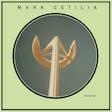 The New Way was funded in part by the RISD Professional Development Fund, but don’t go putting on your monocle and bowtie just yet: this isn’t the stuffy academic composition of yore. Mark Cetilia is clearly a trained and educated producer of electronic music, but The New Way is lively and downright aggressive at times, less about the majestic presence of a few select tones so much as the chaos that can ensue from multiple electronic processes firing off at the same time. “Analog / digital electronics” are the credited instrumentation, and they’re described as both “improvised and generative” which makes sense when sitting down with it. Some of this stuff sounds like sparks flying from a downed telephone cable, whereas certain tones are so sumptuously synthetic it’s like watching sunlight hit the moon’s surface inside the Metaverse. If you’ve got two full twelve-inch LPs of electronic music at your disposal, might as well mix it up! Part of me wants to compare The New Way to Forcefield (it’s the Providence connection), but I’m also reminded of deliberate electronic synthesists like Black Merlin (though in the case of Mark Cetilia, only the faintest trace of techno can be detected here). Lots of patience-testing frequencies and brain-scrambling sonic mixtures to be found through this double album, but if you enjoy experiencing the wild things a person can do with a laptop and some gear, that’s probably what you’re after in the first place.
The New Way was funded in part by the RISD Professional Development Fund, but don’t go putting on your monocle and bowtie just yet: this isn’t the stuffy academic composition of yore. Mark Cetilia is clearly a trained and educated producer of electronic music, but The New Way is lively and downright aggressive at times, less about the majestic presence of a few select tones so much as the chaos that can ensue from multiple electronic processes firing off at the same time. “Analog / digital electronics” are the credited instrumentation, and they’re described as both “improvised and generative” which makes sense when sitting down with it. Some of this stuff sounds like sparks flying from a downed telephone cable, whereas certain tones are so sumptuously synthetic it’s like watching sunlight hit the moon’s surface inside the Metaverse. If you’ve got two full twelve-inch LPs of electronic music at your disposal, might as well mix it up! Part of me wants to compare The New Way to Forcefield (it’s the Providence connection), but I’m also reminded of deliberate electronic synthesists like Black Merlin (though in the case of Mark Cetilia, only the faintest trace of techno can be detected here). Lots of patience-testing frequencies and brain-scrambling sonic mixtures to be found through this double album, but if you enjoy experiencing the wild things a person can do with a laptop and some gear, that’s probably what you’re after in the first place.
Chrome Jackson Cyborgs LP (Wrong Way Archival Bureau)
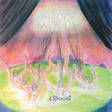 Stephen Mattos has been utilizing the electric guitar as a sonic irritant for decades now, from Arab On Radar to Athletic Automaton and Doomsday Student. Most recently, he’s been self-recording under the Chrome Jackson moniker, which sounds very much in line with what one might expect from “Arab On Radar guitarist solo project”. Most of these tracks start with a ramshackle, unchanging percussion loop, over which Mattos layers one or more guitars, usually delivered with the tone of an aggravated hornet’s nest, though certain guitars are more effected and elastic, calling to mind some sort of nightmarish day-glo psychedelia that one might associate with his old label, Load Records. The beats are more like looped Looney Tunes sound-effects than drum patterns (check the chattering teeth of “Jellyfish”) and alongside these caustic guitar lines, everything works nicely, trebly fits of anxiety and unexpected mutation. Things generally feel loosely improvised, with motifs reappearing in more of an unstructured way, as if we’re right there in the Chrome Jackson laboratory as he stomps different effects pedals and weaves his way through a variety of neon noises. Fort Thunder is surely yuppified condos by now but its spirit lives on.
Stephen Mattos has been utilizing the electric guitar as a sonic irritant for decades now, from Arab On Radar to Athletic Automaton and Doomsday Student. Most recently, he’s been self-recording under the Chrome Jackson moniker, which sounds very much in line with what one might expect from “Arab On Radar guitarist solo project”. Most of these tracks start with a ramshackle, unchanging percussion loop, over which Mattos layers one or more guitars, usually delivered with the tone of an aggravated hornet’s nest, though certain guitars are more effected and elastic, calling to mind some sort of nightmarish day-glo psychedelia that one might associate with his old label, Load Records. The beats are more like looped Looney Tunes sound-effects than drum patterns (check the chattering teeth of “Jellyfish”) and alongside these caustic guitar lines, everything works nicely, trebly fits of anxiety and unexpected mutation. Things generally feel loosely improvised, with motifs reappearing in more of an unstructured way, as if we’re right there in the Chrome Jackson laboratory as he stomps different effects pedals and weaves his way through a variety of neon noises. Fort Thunder is surely yuppified condos by now but its spirit lives on.
Dale Cornish Traditional Music Of South London LP (The Death Of Rave)
 Lots of boldly cheeky proclamations happening here, from the album title to the name of the label that released it. I’m not certain that either description is applicable in this particular case, but that’s fine with me, as Traditional Music For South London is another inventive record from London’s Dale Cornish, and the most excellent I’ve heard from him thus far. His releases tend to finger a weird theme and work it out, and this time around, he takes knotty techno as his focus and has buckets of fun playing around with it. Don’t file it under “experimental” or, even worse, “ironic”, though, as Cornish has a keen handle on what makes a weird club hit, preferring to create brand new sticky, slurpy grooves as opposed to abstraction for abstraction’s sake. 4/4 thumps are grounded, hi-hats are slightly crusty, and the rhythmic accompaniment is fancy and fun. I’d probably compare some of these tracks (like say, “Hoist Crash Fort”) to the sort of techno trickery Powell was engaging in back in the mid ’10s, though Cornish’s music isn’t sample-derived so much as coming from some other strange place, deep in the recesses of his gear. His voice appears on occasion as well, sometimes modified beyond recognition and sometimes clear and direct; take for example the palate-cleansing acoustic-guitar ditty that is “Norman Lewis”. It can happen that when you try to be a brazen punk and also play techno, you end up alienating both sides of the equation, but Traditional Music Of South London is sure to unite weekend club-night enthusiasts and the defiant artists who mill around smoking outside of them.
Lots of boldly cheeky proclamations happening here, from the album title to the name of the label that released it. I’m not certain that either description is applicable in this particular case, but that’s fine with me, as Traditional Music For South London is another inventive record from London’s Dale Cornish, and the most excellent I’ve heard from him thus far. His releases tend to finger a weird theme and work it out, and this time around, he takes knotty techno as his focus and has buckets of fun playing around with it. Don’t file it under “experimental” or, even worse, “ironic”, though, as Cornish has a keen handle on what makes a weird club hit, preferring to create brand new sticky, slurpy grooves as opposed to abstraction for abstraction’s sake. 4/4 thumps are grounded, hi-hats are slightly crusty, and the rhythmic accompaniment is fancy and fun. I’d probably compare some of these tracks (like say, “Hoist Crash Fort”) to the sort of techno trickery Powell was engaging in back in the mid ’10s, though Cornish’s music isn’t sample-derived so much as coming from some other strange place, deep in the recesses of his gear. His voice appears on occasion as well, sometimes modified beyond recognition and sometimes clear and direct; take for example the palate-cleansing acoustic-guitar ditty that is “Norman Lewis”. It can happen that when you try to be a brazen punk and also play techno, you end up alienating both sides of the equation, but Traditional Music Of South London is sure to unite weekend club-night enthusiasts and the defiant artists who mill around smoking outside of them.
Carla dal Forno Come Around LP (Kallista)
 Fourth album for Carla dal Forno, who solidified her personal style while residing in her homeland of Australia, moved to England for another album or two, and has now returned to Melbourne. Seems as though she’d be comfortable any place where there are lush hanging gardens and a stone bench to sit and contemplate, as Come Around is covered with pastoral, blurred images of dal Forno and foliage in full bloom, a common poise on her records. If you weren’t already familiar with her sound, you’d be forgiven for expecting some sort of folk or shoegaze, but dal Forno never wavers from her well-established personal aesthetic, one of patient rhythms, note-by-note bass-lines, calm vocals and dub effects. I thought she mastered her style on 2019’s Look Up Sharp, but Come Around pushes at her internal borders with sharp effect. There’s the sunshine-y guitar on “Come Around”, her first-ever duet “Slumber” (with dashing European recluse Thomas Bush) and an even greater ease in the way these songs are delivered. She might even be kind of happy here? The similarities to Young Marble Giants, Virginia Astley and Anna Domino are still in place, but it never feels like homage or imitation. These songs are precise yet incredibly comfortable, memorable and uncommon, and perhaps most amazingly of all, spotlessly recorded while still retaining the syrupy out-of-time sensation of classic dub. I’d send flowers to congratulate her on a fantastic new record but it seems she already has more than enough.
Fourth album for Carla dal Forno, who solidified her personal style while residing in her homeland of Australia, moved to England for another album or two, and has now returned to Melbourne. Seems as though she’d be comfortable any place where there are lush hanging gardens and a stone bench to sit and contemplate, as Come Around is covered with pastoral, blurred images of dal Forno and foliage in full bloom, a common poise on her records. If you weren’t already familiar with her sound, you’d be forgiven for expecting some sort of folk or shoegaze, but dal Forno never wavers from her well-established personal aesthetic, one of patient rhythms, note-by-note bass-lines, calm vocals and dub effects. I thought she mastered her style on 2019’s Look Up Sharp, but Come Around pushes at her internal borders with sharp effect. There’s the sunshine-y guitar on “Come Around”, her first-ever duet “Slumber” (with dashing European recluse Thomas Bush) and an even greater ease in the way these songs are delivered. She might even be kind of happy here? The similarities to Young Marble Giants, Virginia Astley and Anna Domino are still in place, but it never feels like homage or imitation. These songs are precise yet incredibly comfortable, memorable and uncommon, and perhaps most amazingly of all, spotlessly recorded while still retaining the syrupy out-of-time sensation of classic dub. I’d send flowers to congratulate her on a fantastic new record but it seems she already has more than enough.
Delivery Forever Giving Handshakes LP (Feel It)
 Not sure what to make of the title of Delivery’s full-length debut… are they complaining, or into it? Has anyone told them “well, at least it’s better than hand-jobs!“, and if so, how did they react? Whatever the case, this Melbourne quintet seems to be having plenty of fun on this album, a wiry kind of indie-rock that brushes up against post-punk in appealing ways. A good number of these tunes remind me of fellow Aussies The Shifters, the way in which both bands are clearly well-rehearsed without coming across as uptight, singing songs of domestic anxiety and writing hooks so that we, the listeners, can sing along too. There’s a bit more, uh, angularity to these tunes than that of The Shifters though, with oblong single-string guitar riffs that occasionally call Circus Lupus to my mind. Four of the five members are credited with vocals, but whoever sings the most has a great Chris Thomson-esque tone, though he comes across far less agitated and much more likely to smile or wink. All of this leads to what I’d consider another Excellent Parquet Courts Opening-Act Prospect, a sect of the underground that was probably around even before Parquet Courts themselves but seems to be particularly thriving today. The world doesn’t want the kids today to be funky, friendly and free, and yet Delivery are precisely that.
Not sure what to make of the title of Delivery’s full-length debut… are they complaining, or into it? Has anyone told them “well, at least it’s better than hand-jobs!“, and if so, how did they react? Whatever the case, this Melbourne quintet seems to be having plenty of fun on this album, a wiry kind of indie-rock that brushes up against post-punk in appealing ways. A good number of these tunes remind me of fellow Aussies The Shifters, the way in which both bands are clearly well-rehearsed without coming across as uptight, singing songs of domestic anxiety and writing hooks so that we, the listeners, can sing along too. There’s a bit more, uh, angularity to these tunes than that of The Shifters though, with oblong single-string guitar riffs that occasionally call Circus Lupus to my mind. Four of the five members are credited with vocals, but whoever sings the most has a great Chris Thomson-esque tone, though he comes across far less agitated and much more likely to smile or wink. All of this leads to what I’d consider another Excellent Parquet Courts Opening-Act Prospect, a sect of the underground that was probably around even before Parquet Courts themselves but seems to be particularly thriving today. The world doesn’t want the kids today to be funky, friendly and free, and yet Delivery are precisely that.
Engürdetz Sillmjölke LP (Happiest Place)
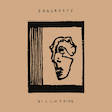 Happiest Place continues to herald the unheralded with their second Engürdetz reissue, this one originally released as a 1988 split cassette with Lille Roger. 1988 was a pretty interesting time for noise, particularly in that it was far removed from both the initial wave and the turn of the millennium’s resurgence. There was no expectation of “fans” beyond a few random folks who were probably also making similarly indigestible noise collages, and there’s a glorious freedom in that, knowing that no one is really paying attention. The satisfaction comes from the creation, not the commercial success, which is how I personally like it! I can see why Happiest Place would go so far as it press this old session up on vinyl, as Sillmjölke bears a striking resemblance (and level of quality) to much of today’s Swedish noise scene. This is crude, tape-deck-based music, which required craftiness and inventiveness if you wanted to create oddball and oppressive sound collages beyond a basic level of flimsy tape hiss. Engürdetz clearly had a knack for such techniques, churning out some impressively heavy low-end among crude loops, abused guitars and tape samples both intense and silly. “Cock-A-Cola” might be my favorite track of the bunch, so brain-numbing is its repetitive vocal loop, but the guitar strangulation and sampled argument of “Calm Fucking Down” feels like the accidental sibling of Harry Pussy, or at least a really great Prick Decay track. I don’t know what sorta material Lille Roger brought to his side of that tape back in 1988 but I hope he brought his best.
Happiest Place continues to herald the unheralded with their second Engürdetz reissue, this one originally released as a 1988 split cassette with Lille Roger. 1988 was a pretty interesting time for noise, particularly in that it was far removed from both the initial wave and the turn of the millennium’s resurgence. There was no expectation of “fans” beyond a few random folks who were probably also making similarly indigestible noise collages, and there’s a glorious freedom in that, knowing that no one is really paying attention. The satisfaction comes from the creation, not the commercial success, which is how I personally like it! I can see why Happiest Place would go so far as it press this old session up on vinyl, as Sillmjölke bears a striking resemblance (and level of quality) to much of today’s Swedish noise scene. This is crude, tape-deck-based music, which required craftiness and inventiveness if you wanted to create oddball and oppressive sound collages beyond a basic level of flimsy tape hiss. Engürdetz clearly had a knack for such techniques, churning out some impressively heavy low-end among crude loops, abused guitars and tape samples both intense and silly. “Cock-A-Cola” might be my favorite track of the bunch, so brain-numbing is its repetitive vocal loop, but the guitar strangulation and sampled argument of “Calm Fucking Down” feels like the accidental sibling of Harry Pussy, or at least a really great Prick Decay track. I don’t know what sorta material Lille Roger brought to his side of that tape back in 1988 but I hope he brought his best.
Extortion Seething 7″ (no label)
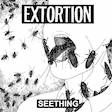 Seething, the newest seven-inch EP from one of Australia’s most revered hardcore-grind groups opens with a moderate crossover riff, just long enough to leave one wondering if this powerhouse unit has toned things down in their old age. Not so! The rest of “Conquest” snaps into high-velocity hardcore as technically flawless as it is raging, and the remaining fourteen tracks maintain that extreme level of relentlessness. It’s a glory to behold! The sheer quantity of grind records out there can lead to listener fatigue, but when a record like Seething arrives, it’s a stark reminder that this style can absolutely blow your wig right off. I really appreciate that Extortion manages to take cues from Crossed Out and Siege, just like everyone else, but rather than replicating those earlier groups to a precise tee, they take the stop/start, slow/fast, extreme-brevity template and make it their own. This sorta thing can live or die by the drumming, and it’s absolutely astounding here, as precise and inhuman as the finest death metal but performed with the rugged attitude of hardcore. Great riffs too, but the drumming is just so forceful and precise that it steals the show. If some other band is ahead of Extortion on today’s grind charts, you’ll have to let me know!
Seething, the newest seven-inch EP from one of Australia’s most revered hardcore-grind groups opens with a moderate crossover riff, just long enough to leave one wondering if this powerhouse unit has toned things down in their old age. Not so! The rest of “Conquest” snaps into high-velocity hardcore as technically flawless as it is raging, and the remaining fourteen tracks maintain that extreme level of relentlessness. It’s a glory to behold! The sheer quantity of grind records out there can lead to listener fatigue, but when a record like Seething arrives, it’s a stark reminder that this style can absolutely blow your wig right off. I really appreciate that Extortion manages to take cues from Crossed Out and Siege, just like everyone else, but rather than replicating those earlier groups to a precise tee, they take the stop/start, slow/fast, extreme-brevity template and make it their own. This sorta thing can live or die by the drumming, and it’s absolutely astounding here, as precise and inhuman as the finest death metal but performed with the rugged attitude of hardcore. Great riffs too, but the drumming is just so forceful and precise that it steals the show. If some other band is ahead of Extortion on today’s grind charts, you’ll have to let me know!
Flex TMG Whisper Swish 12″ (Domestic Departure)
 Funny how time works – I just watched that Meet Me In The Bathroom doc over the weekend, and the debut EP from Flex TMG sounds like it could’ve been ripped directly from that scene. Their sound is immediately identifiable as the party-friendly indie-disco that James Murphy wanted to hear in 2002, a slick and funky form of dance rebellion that Troubleman Unlimited would’ve jumped on during Dubya’s first term in office. How does it sound now, you ask? I can’t speak for all retro no-wave disco acts that existed from 2001 through present, but Flex TMG sound pretty sweet on Whisper Swish, more of a natural fit for their particular talents than another project trying to sound like everyone else. For one, not many acts are sounding like Liquid Liquid and Pigbag these days, so I’m assuming Flex TMG’s intentions are true, and they do right by the sound, with perfectly muted bass tones, percolating synths and rhythm tracks that deliver only the necessities: 4/4 kick, the clatter of snare and hi-hat in various forms and at least one cowbell. Vocalist Hannah D’Amato is confident and cool, and the backing tracks (the work of one Rob I. Miller) are lively and interesting, coming together to propose an alternate timeline where Karen O fronted !!!. Actually, that probably must’ve happened at some point, but I’d rather just listen to Flex TMG now anyway!
Funny how time works – I just watched that Meet Me In The Bathroom doc over the weekend, and the debut EP from Flex TMG sounds like it could’ve been ripped directly from that scene. Their sound is immediately identifiable as the party-friendly indie-disco that James Murphy wanted to hear in 2002, a slick and funky form of dance rebellion that Troubleman Unlimited would’ve jumped on during Dubya’s first term in office. How does it sound now, you ask? I can’t speak for all retro no-wave disco acts that existed from 2001 through present, but Flex TMG sound pretty sweet on Whisper Swish, more of a natural fit for their particular talents than another project trying to sound like everyone else. For one, not many acts are sounding like Liquid Liquid and Pigbag these days, so I’m assuming Flex TMG’s intentions are true, and they do right by the sound, with perfectly muted bass tones, percolating synths and rhythm tracks that deliver only the necessities: 4/4 kick, the clatter of snare and hi-hat in various forms and at least one cowbell. Vocalist Hannah D’Amato is confident and cool, and the backing tracks (the work of one Rob I. Miller) are lively and interesting, coming together to propose an alternate timeline where Karen O fronted !!!. Actually, that probably must’ve happened at some point, but I’d rather just listen to Flex TMG now anyway!
Grotto Terrazza Kalte Köstlichkeiten LP (Maple Death / Cut Surface)
 Lots of pulpy fun to be had here within Kalte Köstlichkeiten, the first vinyl outing for Munich’s Thomas Schamann under his Grotto Terrazza guise. These retro tracks are geared to setting the scene from top to bottom, with rotary phones ringing in the background, convertible sports cars peeling out past palm trees, scorned lovers staring at each other across the room and phone numbers scrawled on hotel-bar napkins. It’s like library music for German millionaire playboys and the detectives who have to figure out who murdered them. The instrumentation seems to vary track-by-track, mostly instrumental in nature, veering from classic Giorgio Moroder electro to Delroy Edwards-styled roller-rink funk to wistful Molly Nilsson-esque serenades. Grotto Terrazza takes it a step further sometimes, with tracks like “Dusty Kapers Skit” operating as pictureless film shorts more than songs, which adds to the madcap fun, even if it the whole thing is steeped in fantasy nostalgia. A little Tarantino in there, and a little Altman too, which helps tie it together. Nothing wrong with ostentatious revelry, especially if you’re doing it with the straight-faced humor (and new-wave funk) of DAF, as can be the case here. The title translates to “Cold Delicacies”, a perfect fit no matter the native tongue.
Lots of pulpy fun to be had here within Kalte Köstlichkeiten, the first vinyl outing for Munich’s Thomas Schamann under his Grotto Terrazza guise. These retro tracks are geared to setting the scene from top to bottom, with rotary phones ringing in the background, convertible sports cars peeling out past palm trees, scorned lovers staring at each other across the room and phone numbers scrawled on hotel-bar napkins. It’s like library music for German millionaire playboys and the detectives who have to figure out who murdered them. The instrumentation seems to vary track-by-track, mostly instrumental in nature, veering from classic Giorgio Moroder electro to Delroy Edwards-styled roller-rink funk to wistful Molly Nilsson-esque serenades. Grotto Terrazza takes it a step further sometimes, with tracks like “Dusty Kapers Skit” operating as pictureless film shorts more than songs, which adds to the madcap fun, even if it the whole thing is steeped in fantasy nostalgia. A little Tarantino in there, and a little Altman too, which helps tie it together. Nothing wrong with ostentatious revelry, especially if you’re doing it with the straight-faced humor (and new-wave funk) of DAF, as can be the case here. The title translates to “Cold Delicacies”, a perfect fit no matter the native tongue.
Gunfighter Ballads 7″ (Under The Gun)
 This one takes me back, all the way back… to like 2008! Right around that time, punks started breaking out of the band format en masse, setting up practice amps in weird bedroom configurations and recording whatever nonsense they could muster without their roommates calling a house meeting. As Liam would say, I don’t look back on that time in anger, and it’s nice that artists like Gunfighter are keeping that particular flame alive. With Ballads, a drum machine on one of its three basic settings lays down a rhythm, surfy, garage-y guitar comes streaming out in impetuously low fidelity, and a guy gobbles and quacks as though he were accidentally possessed by the spirit of the Surfin’ Bird. Less aggressive than the Pillow Talk seven-inch but more jarring than even the earliest Cramps singles, Gunfighter almost certainly maintains either obnoxious facial hair, assless chaps or some sort of sartorial detail to call attention to the fact that he routinely flips the bird at God and would sell all of his records to buy a hot rod if he actually owned any records. My favorite song might actually be “Trot, Trot… Shot, Shot”, which eschews guitar entirely for chintzy keyboards, closer to Damian & The Criterions’ “Atlantic City U.S.A.” than Link Wray. A gunfighter he surely ain’t, but maybe one day if we’re lucky, he’ll throw up on Orville Peck’s fake-ass cowboy boots somewhere on the Sunset Strip.
This one takes me back, all the way back… to like 2008! Right around that time, punks started breaking out of the band format en masse, setting up practice amps in weird bedroom configurations and recording whatever nonsense they could muster without their roommates calling a house meeting. As Liam would say, I don’t look back on that time in anger, and it’s nice that artists like Gunfighter are keeping that particular flame alive. With Ballads, a drum machine on one of its three basic settings lays down a rhythm, surfy, garage-y guitar comes streaming out in impetuously low fidelity, and a guy gobbles and quacks as though he were accidentally possessed by the spirit of the Surfin’ Bird. Less aggressive than the Pillow Talk seven-inch but more jarring than even the earliest Cramps singles, Gunfighter almost certainly maintains either obnoxious facial hair, assless chaps or some sort of sartorial detail to call attention to the fact that he routinely flips the bird at God and would sell all of his records to buy a hot rod if he actually owned any records. My favorite song might actually be “Trot, Trot… Shot, Shot”, which eschews guitar entirely for chintzy keyboards, closer to Damian & The Criterions’ “Atlantic City U.S.A.” than Link Wray. A gunfighter he surely ain’t, but maybe one day if we’re lucky, he’ll throw up on Orville Peck’s fake-ass cowboy boots somewhere on the Sunset Strip.
Horse Lords Comradely Objects LP (Rvng Intl.)
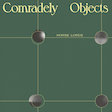 Gotta hand it to whoever is in charge of Horse Lords’ publicity, because they’ve been everywhere lately! Can’t pull up a music website without seeing their name, it seems, and while I’m sure part of that is lucky timing or whatever, it also feels well deserved. The Baltimore group’s newest album, Comradely Objects, is as skillfully composed as it is easy to listen to, hitting that sweet spot where experimental composition overlaps with upbeat and joyous melodies, like a sweet candy that actually improves your health. I really appreciate that this is a band, a group of multiple people committed to the same (unusual) musical cause who work it out together under a shared title. Feels like there’s far less of that than individual collaborative players and solo projects, and I appreciate the rarity in finding and gelling with three or four other likeminded souls, particularly in a scruffy little city like Baltimore. Anyway, not enough talk about the actual music outta me: it’s drums, guitar, sax, bass and electronics, performed the way a band would play, but written in the form of complex “just intonation” compositions. These are extremely cyclical pieces, full of changes that you don’t realize are changes and quite dazzling in the steadfast repetition where even the slightest flub could send the whole thing crashing. In the same aesthetic neighborhood as Joshua Abrams Natural Information Society at times, what with the unflinching grooves and abstract patterns, and the same general sense that they’re trying to unlock the key to happiness via complex mathematical tuning and composition. I’d say they’ve gotten there, because Comradely Objects slaps a big smile on my face every time.
Gotta hand it to whoever is in charge of Horse Lords’ publicity, because they’ve been everywhere lately! Can’t pull up a music website without seeing their name, it seems, and while I’m sure part of that is lucky timing or whatever, it also feels well deserved. The Baltimore group’s newest album, Comradely Objects, is as skillfully composed as it is easy to listen to, hitting that sweet spot where experimental composition overlaps with upbeat and joyous melodies, like a sweet candy that actually improves your health. I really appreciate that this is a band, a group of multiple people committed to the same (unusual) musical cause who work it out together under a shared title. Feels like there’s far less of that than individual collaborative players and solo projects, and I appreciate the rarity in finding and gelling with three or four other likeminded souls, particularly in a scruffy little city like Baltimore. Anyway, not enough talk about the actual music outta me: it’s drums, guitar, sax, bass and electronics, performed the way a band would play, but written in the form of complex “just intonation” compositions. These are extremely cyclical pieces, full of changes that you don’t realize are changes and quite dazzling in the steadfast repetition where even the slightest flub could send the whole thing crashing. In the same aesthetic neighborhood as Joshua Abrams Natural Information Society at times, what with the unflinching grooves and abstract patterns, and the same general sense that they’re trying to unlock the key to happiness via complex mathematical tuning and composition. I’d say they’ve gotten there, because Comradely Objects slaps a big smile on my face every time.
Kitchen’s Floor None Of That LP (Petty Bunco / Eternal Soundcheck)
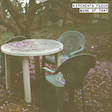 The past couple years have been particularly bad for all of us, but jeez, someone go check on Matt Kennedy, the sole constant member of Kitchen’s Floor! Sure, he’s the type of songwriter who thought the phrase “kidney / kidney infection” worked for a vocal hook (“Kidney Infection”, 2011), but the lyrics to None Of That are bleaker than bleak… they make Nick Drake sound like Andrew WK or something. The chorus of “Before Dawn” goes “I wanna die before dawn” and it’s hard not to take him seriously. I hope he’s just getting it out through his art, as I’ve loved the music of Kitchen’s Floor for as long as I’ve known it, and this newest one (after a fairly long absence) is great, the sort of thing that deserves more shows, tours, and at the very least, continued living. It’s some of Kennedy’s heaviest music on a sonic level too, with plenty of heavily-distorted guitars, rumbling bass and vocals as often shouted as they are murmured – “Blood” could be a damn Slapshot cover, I swear. I’ve enjoyed Kitchen’s Floor as a creaky, lo-fi acoustic-guitar project, but None Of That has some thick hairy meat on its bones and I find it particularly satisfying, recalling both strum-centric Kiwi pop and the darkly aggressive post-punk garage of Venom P. Stinger depending on the tune. The most moshworthy Petty Bunco release you’ll hear this year, unless they plan on sneaking out a Violent Students VHS tape in time for Christmas.
The past couple years have been particularly bad for all of us, but jeez, someone go check on Matt Kennedy, the sole constant member of Kitchen’s Floor! Sure, he’s the type of songwriter who thought the phrase “kidney / kidney infection” worked for a vocal hook (“Kidney Infection”, 2011), but the lyrics to None Of That are bleaker than bleak… they make Nick Drake sound like Andrew WK or something. The chorus of “Before Dawn” goes “I wanna die before dawn” and it’s hard not to take him seriously. I hope he’s just getting it out through his art, as I’ve loved the music of Kitchen’s Floor for as long as I’ve known it, and this newest one (after a fairly long absence) is great, the sort of thing that deserves more shows, tours, and at the very least, continued living. It’s some of Kennedy’s heaviest music on a sonic level too, with plenty of heavily-distorted guitars, rumbling bass and vocals as often shouted as they are murmured – “Blood” could be a damn Slapshot cover, I swear. I’ve enjoyed Kitchen’s Floor as a creaky, lo-fi acoustic-guitar project, but None Of That has some thick hairy meat on its bones and I find it particularly satisfying, recalling both strum-centric Kiwi pop and the darkly aggressive post-punk garage of Venom P. Stinger depending on the tune. The most moshworthy Petty Bunco release you’ll hear this year, unless they plan on sneaking out a Violent Students VHS tape in time for Christmas.
Matt Krefting & Bill Nace The Academy LP (Half A Million)
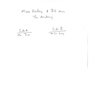 Two hefty sleep paralysis sessions here from Bill Nace and Matt Krefting, both of whom have strong ties to the noisy Massachusetts underground from wherein they’ve resided. Not a lot of information to go by on this one – no credited instrumentation, specifically – but the sound here is so stark, relentless and defined that I suppose a rig rundown isn’t super helpful or necessary. Each of these two pieces works a choppy loop of what, by my amateur estimation, is probably a violin or some other string instrument being patiently bowed, the sound slowly layered upon itself and speckled with the accidental percussion of microphones being struck or buttons being pressed. They slowly build, Alvin Lucier-like, though there is no crescendo or violent overloading of sound; both of these tracks find a restless point of gravity and orbit it like drunken moths around a bulb. The titles “Mr. Jinx” and “Miss Lucy” offer little insight, though my best guess here is that they’re probably cats’ names? Maybe they’re people? Did cats make this music? Everything I’m doing is guesswork here, except of course for laying back in a reclined position and allowing these two wobbly drones to burrow into one of my ears and slowly drift out the other.
Two hefty sleep paralysis sessions here from Bill Nace and Matt Krefting, both of whom have strong ties to the noisy Massachusetts underground from wherein they’ve resided. Not a lot of information to go by on this one – no credited instrumentation, specifically – but the sound here is so stark, relentless and defined that I suppose a rig rundown isn’t super helpful or necessary. Each of these two pieces works a choppy loop of what, by my amateur estimation, is probably a violin or some other string instrument being patiently bowed, the sound slowly layered upon itself and speckled with the accidental percussion of microphones being struck or buttons being pressed. They slowly build, Alvin Lucier-like, though there is no crescendo or violent overloading of sound; both of these tracks find a restless point of gravity and orbit it like drunken moths around a bulb. The titles “Mr. Jinx” and “Miss Lucy” offer little insight, though my best guess here is that they’re probably cats’ names? Maybe they’re people? Did cats make this music? Everything I’m doing is guesswork here, except of course for laying back in a reclined position and allowing these two wobbly drones to burrow into one of my ears and slowly drift out the other.
Kilynn Lunsford Custodians Of Human Succession LP (Ever/Never)
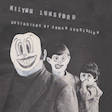 Kilynn Lunsford has frequently been the coolest-dressed person in basements all across the United States, spending the ’00s in Little Claw and the ’10s in Taiwan Housing Project (among other bits and pieces). And now, after plenty of time making music moderated by traditional dude-filled backing bands, she’s cutting out on her own with Custodians Of Human Succession. I loved Taiwan Housing Project, but if you’re willing to consider my opinion, this is her finest work yet! I’d say it’s her Queen Of Siam, though any theatrics found here are wonderfully tawdry, and to be honest I’d rather listen to Custodians anyway. Lunsford comes across as murderous one moment and wounded the next, saturating these skeletal-yet-vibrant tracks with a spectrum of high emotion. Even when deadpanning, like on the perfect album opener “Reality Testing”, I feel drawn in to her vibe no matter if it becomes increasingly clear that she’s putting me in danger. Reminds me of Die Tödliche Doris at their least shrill, the morbid synth-wave of art-punks like Voice Farm and German Shepherds and the more disturbing ends of early no-wave (think Boris Policeband and Jeff & Jane Hudson). My favorite cut might be “Three Babies Make Ten”, whose funky bass-line and maddeningly looped vocals make it near-impossible to comfortably file in any pre-existing slot. I think we all expected this solo debut to be good, but it’s really really great!
Kilynn Lunsford has frequently been the coolest-dressed person in basements all across the United States, spending the ’00s in Little Claw and the ’10s in Taiwan Housing Project (among other bits and pieces). And now, after plenty of time making music moderated by traditional dude-filled backing bands, she’s cutting out on her own with Custodians Of Human Succession. I loved Taiwan Housing Project, but if you’re willing to consider my opinion, this is her finest work yet! I’d say it’s her Queen Of Siam, though any theatrics found here are wonderfully tawdry, and to be honest I’d rather listen to Custodians anyway. Lunsford comes across as murderous one moment and wounded the next, saturating these skeletal-yet-vibrant tracks with a spectrum of high emotion. Even when deadpanning, like on the perfect album opener “Reality Testing”, I feel drawn in to her vibe no matter if it becomes increasingly clear that she’s putting me in danger. Reminds me of Die Tödliche Doris at their least shrill, the morbid synth-wave of art-punks like Voice Farm and German Shepherds and the more disturbing ends of early no-wave (think Boris Policeband and Jeff & Jane Hudson). My favorite cut might be “Three Babies Make Ten”, whose funky bass-line and maddeningly looped vocals make it near-impossible to comfortably file in any pre-existing slot. I think we all expected this solo debut to be good, but it’s really really great!
Moin Paste LP (AD 93)
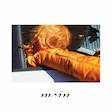 I remember when I first heard Raime, and how taken aback I was by the intense emptiness of their music… how could you get away with what sounded like distant echoes of basketballs dribbled in an airport hangar as the entirety of a track?? I felt a similarly minor shock upon hearing the Raime side-project Moin for the first time (or is Raime the side-project of Moin now?), as this British electronic duo, firmly settled in the avant-electronic world, made a record that sounded like the quiet parts of Chino Horde or Still Life songs and nothing more. How’d these British ravers know about American emo?? Shame on me for presuming techno guys don’t have rich interior listening obsessions. Now that I’ve heard a few of their records, I’ve come to expect this exquisitely reductive take on ’90s emo-core from Moin, and Paste maintains the path they’ve forged. Live drums care of the omnipresent Valentina Magaletti match stiff, muted guitars, resulting in “quiet part” emo-core instrumentals that recall those I Hate Myself and Indian Summer moments before the drums kick in and the screaming (read: crying) starts. In lieu of such a vocalist, Moin utilize a bevy of spoken-word samples, apparently often poetry readings from decades prior, to provide the (fabricated) human gravitas that these morose rock instrumentals benefit from. I wouldn’t argue if you called it a gimmick, but it’s a trick no one else thought of, and an album that’ll leave an impression no matter what side of the rock / electronic fence you’re on.
I remember when I first heard Raime, and how taken aback I was by the intense emptiness of their music… how could you get away with what sounded like distant echoes of basketballs dribbled in an airport hangar as the entirety of a track?? I felt a similarly minor shock upon hearing the Raime side-project Moin for the first time (or is Raime the side-project of Moin now?), as this British electronic duo, firmly settled in the avant-electronic world, made a record that sounded like the quiet parts of Chino Horde or Still Life songs and nothing more. How’d these British ravers know about American emo?? Shame on me for presuming techno guys don’t have rich interior listening obsessions. Now that I’ve heard a few of their records, I’ve come to expect this exquisitely reductive take on ’90s emo-core from Moin, and Paste maintains the path they’ve forged. Live drums care of the omnipresent Valentina Magaletti match stiff, muted guitars, resulting in “quiet part” emo-core instrumentals that recall those I Hate Myself and Indian Summer moments before the drums kick in and the screaming (read: crying) starts. In lieu of such a vocalist, Moin utilize a bevy of spoken-word samples, apparently often poetry readings from decades prior, to provide the (fabricated) human gravitas that these morose rock instrumentals benefit from. I wouldn’t argue if you called it a gimmick, but it’s a trick no one else thought of, and an album that’ll leave an impression no matter what side of the rock / electronic fence you’re on.
Mutated Void Slash The Altar 7″ (Sewercide)
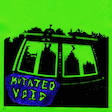 Has Nova Scotia’s Mutated Void done a split with The Radioactive Faith yet? Released by Violent Dischord Records, of course. This hardcore group doesn’t hide their influences, both aesthetically and musically, and when it comes to dirty unhinged hardcore, that works for me. At first pass, the nearly black-metal vocals threw me for a loop (a similar sensation to when I heard Devola and Jeromes Dream for the first time, leading me to ask myself “did they really take it that far?”), but taking hardcore in an extreme direction is always a more successful path than a polished or “experimental” one. United Mutation, Void and No Trend are clearly some reference points, but the classic band I’m hearing the most is Septic Death. I always wondered why there weren’t many/any Septic Death clones, though I suppose their style is too singular to truly emulate. Mutated Void come pretty close though, with song structures that nervously jump between parts, slam headfirst into dead-ends and scatter like rats. Thanks to the over-the-top Pushead-goes-metal vocal approach, Slash The Altar results in the sort of spastic, blackened hardcore that would’ve sat well amongst Youth Attack’s roster circa 2010 (though not as well amongst their current “I’m a big mean angry man all of the time” vibe). I can’t imagine there’s more than one band in Nova Scotia that sounds like this, and if there is, it’s Mutated Void’s duty to kill the others.
Has Nova Scotia’s Mutated Void done a split with The Radioactive Faith yet? Released by Violent Dischord Records, of course. This hardcore group doesn’t hide their influences, both aesthetically and musically, and when it comes to dirty unhinged hardcore, that works for me. At first pass, the nearly black-metal vocals threw me for a loop (a similar sensation to when I heard Devola and Jeromes Dream for the first time, leading me to ask myself “did they really take it that far?”), but taking hardcore in an extreme direction is always a more successful path than a polished or “experimental” one. United Mutation, Void and No Trend are clearly some reference points, but the classic band I’m hearing the most is Septic Death. I always wondered why there weren’t many/any Septic Death clones, though I suppose their style is too singular to truly emulate. Mutated Void come pretty close though, with song structures that nervously jump between parts, slam headfirst into dead-ends and scatter like rats. Thanks to the over-the-top Pushead-goes-metal vocal approach, Slash The Altar results in the sort of spastic, blackened hardcore that would’ve sat well amongst Youth Attack’s roster circa 2010 (though not as well amongst their current “I’m a big mean angry man all of the time” vibe). I can’t imagine there’s more than one band in Nova Scotia that sounds like this, and if there is, it’s Mutated Void’s duty to kill the others.
Non Plus Temps Desire Choir LP (Post Present Medium)
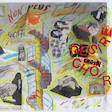 The last out-of-nowhere unanimous favorite to come from Post Present Medium was P22’s phenomenal Human Snake back in 2020, and it seems a similar acclaim is worthy of bestowing upon Non Plus Temps’ debut, Desire Choir. I still have no idea who anyone involved with P22 is, whereas Non Plus Temps feature the familiar names of Sam Lefebvre (the talented writer also of Preening fame) and Andy Human (of an ever-increasing number of Bay Area rock projects). Rather than the unfiltered skree of Preening or the classic garage sounds of Andy Human’s many bands, Non Plus Temps is dubbed-out post-punk through and through, where various friends guest on instruments and vocals as needed and groove is always king. No sampling is noted in the credits, but the way in which horns and voices and keys slide over and throughout these tunes has me wondering how it all came together… in Non Plus Temps’ hands, it all seems so easy and natural. The roomy drum sound, passive vocals and dub bass-lines bear frequent similarities to Exek (and less directly, Anika) – a song like “Facts Sound Like Myths” shares so many facets with the first couple of Exek records that you could’ve slapped their name on it and put one over on me, if that’s how you like to get your kicks. Nevertheless, there is room for at least two excellent On U-Sound-influenced contemporary post-punk acts in my life and Non Plus Temps is certainly one of them, even if it feels like a minor scene betrayal that Max Nordile’s presence is nowhere to be found on Desire Choir. Maybe they’re saving him for next time?
The last out-of-nowhere unanimous favorite to come from Post Present Medium was P22’s phenomenal Human Snake back in 2020, and it seems a similar acclaim is worthy of bestowing upon Non Plus Temps’ debut, Desire Choir. I still have no idea who anyone involved with P22 is, whereas Non Plus Temps feature the familiar names of Sam Lefebvre (the talented writer also of Preening fame) and Andy Human (of an ever-increasing number of Bay Area rock projects). Rather than the unfiltered skree of Preening or the classic garage sounds of Andy Human’s many bands, Non Plus Temps is dubbed-out post-punk through and through, where various friends guest on instruments and vocals as needed and groove is always king. No sampling is noted in the credits, but the way in which horns and voices and keys slide over and throughout these tunes has me wondering how it all came together… in Non Plus Temps’ hands, it all seems so easy and natural. The roomy drum sound, passive vocals and dub bass-lines bear frequent similarities to Exek (and less directly, Anika) – a song like “Facts Sound Like Myths” shares so many facets with the first couple of Exek records that you could’ve slapped their name on it and put one over on me, if that’s how you like to get your kicks. Nevertheless, there is room for at least two excellent On U-Sound-influenced contemporary post-punk acts in my life and Non Plus Temps is certainly one of them, even if it feels like a minor scene betrayal that Max Nordile’s presence is nowhere to be found on Desire Choir. Maybe they’re saving him for next time?
Norcos Y Horchata Forever Disheveled LP (Rust On The Blade)
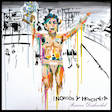 New band here from Amado Movado of Bill Bondsmen and Devious Ones, following a classic trajectory from aggressive hardcore-punk to sing-songy adult-oriented pop-punk. In a flash, we seem to transition from high-school-class-cutting miscreants to stay-at-home dads wearing newsboy caps to cover up bald spots, and I don’t see any reason to stop playing music once that happens (though sharing it publicly can be another story). The songs here fall into a sort of Riverdales / Flogging Molly / Hold Steady axis, local anthems for craft beer tastings, dog adoption drives and I dunno, any lovable-loser behavior with a punk frame of reference. My favorite part of Forever Disheveled, by far, is opener “All Roads Lead Downriver (Dix & Champaign Forever)”, which, intentionally or not, involves a repeated sing-along chorus of “Dix and Champaign forever!”, which can take on an entirely different meaning if you’re hearing it instead of reading it. Kinda wish Norcos Y Horchata were an unabashedly hedonistic pop-punk troupe ala Pansy Division, but Pansy Division might still be around anyway. Maybe they’ll cover it!
New band here from Amado Movado of Bill Bondsmen and Devious Ones, following a classic trajectory from aggressive hardcore-punk to sing-songy adult-oriented pop-punk. In a flash, we seem to transition from high-school-class-cutting miscreants to stay-at-home dads wearing newsboy caps to cover up bald spots, and I don’t see any reason to stop playing music once that happens (though sharing it publicly can be another story). The songs here fall into a sort of Riverdales / Flogging Molly / Hold Steady axis, local anthems for craft beer tastings, dog adoption drives and I dunno, any lovable-loser behavior with a punk frame of reference. My favorite part of Forever Disheveled, by far, is opener “All Roads Lead Downriver (Dix & Champaign Forever)”, which, intentionally or not, involves a repeated sing-along chorus of “Dix and Champaign forever!”, which can take on an entirely different meaning if you’re hearing it instead of reading it. Kinda wish Norcos Y Horchata were an unabashedly hedonistic pop-punk troupe ala Pansy Division, but Pansy Division might still be around anyway. Maybe they’ll cover it!
Prayer Group Michael Dose LP (Reptilian)
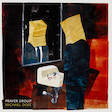 Some grisly Eastern seaboard noise-rock here from Richmond’s Prayer Group (on Baltimore’s longstanding Reptilian Records). Hadn’t heard of this band prior to my encounter here, but it’s nice to know there’s another sonically-unfriendly rock group down in Richmond when needed. Their style bears a direct relation to The Jesus Lizard, with riffs that push and pull and stomp without fully moshing, and a vocalist who howls in a manner that demonstrates he is aware of the music played by his bandmates but not directly beholden to their time signatures. A track like “Speculative Fiction” reminds me a bit of Philadelphia’s Leather, whom I personally deeply miss, though Prayer Group are a bit more relaxed in their approach. At the very least, they seem to arrive at their sound via Am Rep and hardcore versus any form of technically-driven metal, much to my relief. Closer to Unsane than Hydra Head, though fans of either entity would surely respect what Prayer Group are doing here, or so I’d like to think.
Some grisly Eastern seaboard noise-rock here from Richmond’s Prayer Group (on Baltimore’s longstanding Reptilian Records). Hadn’t heard of this band prior to my encounter here, but it’s nice to know there’s another sonically-unfriendly rock group down in Richmond when needed. Their style bears a direct relation to The Jesus Lizard, with riffs that push and pull and stomp without fully moshing, and a vocalist who howls in a manner that demonstrates he is aware of the music played by his bandmates but not directly beholden to their time signatures. A track like “Speculative Fiction” reminds me a bit of Philadelphia’s Leather, whom I personally deeply miss, though Prayer Group are a bit more relaxed in their approach. At the very least, they seem to arrive at their sound via Am Rep and hardcore versus any form of technically-driven metal, much to my relief. Closer to Unsane than Hydra Head, though fans of either entity would surely respect what Prayer Group are doing here, or so I’d like to think.
Rhyw Honey Badger 12″ (Voam)
 Blawan’s Voam label has come to deliver left-field techno records as hard-hitting as they are strange, and this new one from Berlin’s Rhyw sticks to the MO. “Honey Badger” is the star of the show here, and it’s a pretty memorable one. While it has the corset-popping low-end and sturdy thwack of the finest Blawan beater, its groove consistently stumbles over itself, surely resulting in some confused (if entertained) dancers. It’s like walking down a flight of stairs where every seventh step is missing or twice the size, and it’s a bold move for anyone whose purpose is to move a crowd in unison. “Sharknado” follows, and it locks into steel-plated rhythm immediately, with some sort of gating effect that adds a car-chase sort of tension to what is otherwise some pristine techno artillery. “Kirkhusa” is a little freakier, a fast staccato bounce that sounds rubbery yet painful, like getting smacked with a tire. “Foamcore” wraps it up, as playfully elastic as the rest of the EP but with more of a hands-in-the-air sensibility than the evil trickery of the title track. There’s a party-drug aggression to the whole thing, imposing techno that’s dizzying if you try to pay close attention and likely to raise your heart-rate even if experienced passively. In other words, perfect for Voam!
Blawan’s Voam label has come to deliver left-field techno records as hard-hitting as they are strange, and this new one from Berlin’s Rhyw sticks to the MO. “Honey Badger” is the star of the show here, and it’s a pretty memorable one. While it has the corset-popping low-end and sturdy thwack of the finest Blawan beater, its groove consistently stumbles over itself, surely resulting in some confused (if entertained) dancers. It’s like walking down a flight of stairs where every seventh step is missing or twice the size, and it’s a bold move for anyone whose purpose is to move a crowd in unison. “Sharknado” follows, and it locks into steel-plated rhythm immediately, with some sort of gating effect that adds a car-chase sort of tension to what is otherwise some pristine techno artillery. “Kirkhusa” is a little freakier, a fast staccato bounce that sounds rubbery yet painful, like getting smacked with a tire. “Foamcore” wraps it up, as playfully elastic as the rest of the EP but with more of a hands-in-the-air sensibility than the evil trickery of the title track. There’s a party-drug aggression to the whole thing, imposing techno that’s dizzying if you try to pay close attention and likely to raise your heart-rate even if experienced passively. In other words, perfect for Voam!
Sluggo Sluggo LP (4.Q.)
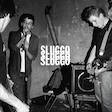 If you had a hardcore band in the early ’80s and it hasn’t received a reissue retrospective with sepia-toned live shots, a comprehensive booklet and quotes from the successful indie-rockers who attended your shows as awestruck teens, did that band really exist in the first place? The adultification of first-wave hardcore-punk is still a little weird to me, treating and presenting teen-written songs with the sentiment of “my school sucks” as though they share the seriousness of a Cy Twombly canvas or Eileen Myles poem. I mean, I think teen punk is one of the greatest human inventions, but it still feels slightly off somehow, the whole reissue ecosystem (Numero Group in particular) that’s putting its money into the past versus the present. Sluggo were Cincinnati’s premier early ’80s hardcore unit (and the effusive quote on the promo sticker here comes from David Grubbs), and their legacy is heralded here with not only a reissue of their sole seven-inch EP Contradiction but the previously-unreleased Eighty-Four EP as well. Not first-tier hardcore by anyone’s estimation I’m sure, but a solid second-tier outing, clearly redolent of Minor Threat, Necros and Ill Repute, with whom they probably shared stages and snail-mail correspondence. Of particular note to hardcore obsessives is the unreleased EP here, which despite its August 1984 recording date sounds more like hardcore circa ’82 than the cross-over thrash, new-wave college-rock and burgeoning emo-core that were exploding the underground at that time, even with the addition of a second guitarist. Now that Sluggo’s dapper retrospective is complete, I think only Jackshit and No Milk On Tuesday are left… any takers?
If you had a hardcore band in the early ’80s and it hasn’t received a reissue retrospective with sepia-toned live shots, a comprehensive booklet and quotes from the successful indie-rockers who attended your shows as awestruck teens, did that band really exist in the first place? The adultification of first-wave hardcore-punk is still a little weird to me, treating and presenting teen-written songs with the sentiment of “my school sucks” as though they share the seriousness of a Cy Twombly canvas or Eileen Myles poem. I mean, I think teen punk is one of the greatest human inventions, but it still feels slightly off somehow, the whole reissue ecosystem (Numero Group in particular) that’s putting its money into the past versus the present. Sluggo were Cincinnati’s premier early ’80s hardcore unit (and the effusive quote on the promo sticker here comes from David Grubbs), and their legacy is heralded here with not only a reissue of their sole seven-inch EP Contradiction but the previously-unreleased Eighty-Four EP as well. Not first-tier hardcore by anyone’s estimation I’m sure, but a solid second-tier outing, clearly redolent of Minor Threat, Necros and Ill Repute, with whom they probably shared stages and snail-mail correspondence. Of particular note to hardcore obsessives is the unreleased EP here, which despite its August 1984 recording date sounds more like hardcore circa ’82 than the cross-over thrash, new-wave college-rock and burgeoning emo-core that were exploding the underground at that time, even with the addition of a second guitarist. Now that Sluggo’s dapper retrospective is complete, I think only Jackshit and No Milk On Tuesday are left… any takers?
Ssabæ Azurescens LP (Few Crackles)
 As if it isn’t miserable enough buying records these days (a hundred bucks gets you what… three albums??), Few Crackles goes and makes it even less fun with this blink-and-missed pressing for Ssabæ. If you can find a place that has it for sale, lemme know so I can tell some friends! The label must be aware of how cool this music is, and yet most of us will have to accept Bandcamp MP3s and YouTube streams for the time being. Anyway, Ssabæ is a French group, presumably sharing some (if not complete) overlap with labelmates Bassæ, and while Bassæ’s last EP was equally impossible-to-find a day after its release last year (and also killer), Azurescens is the richest work from the Few Crackles crew yet. I associate the label with a sort of comatose techno and/or room-clearing avant-industrial, but Ssabæ come from a more pastoral angle, sounding like it was recorded in an ancient cabin in the French countryside where you can see right through the floorboards. Electronics are still at play, but in service to distant guitar, French/wordless vocals, domestic field-recordings and sax. It feels like a lost, severely-damaged ’70s psych record if they had access to today’s recording technology, or if those early Demdike Stare records were inspired by Eric Rohmer films instead of Giallo. Supremely trippy, but not in any sort of forced way – Ssabæ move at their own pace, slightly out of time and welcoming without being patronizing. I’m reminded of my first experiences listening to Nina Harker, another post-industrial/noise/experimental concoction outta France who assured me that weird new strains of music are out there waiting to be created. I just wish we could all purchase a copy!
As if it isn’t miserable enough buying records these days (a hundred bucks gets you what… three albums??), Few Crackles goes and makes it even less fun with this blink-and-missed pressing for Ssabæ. If you can find a place that has it for sale, lemme know so I can tell some friends! The label must be aware of how cool this music is, and yet most of us will have to accept Bandcamp MP3s and YouTube streams for the time being. Anyway, Ssabæ is a French group, presumably sharing some (if not complete) overlap with labelmates Bassæ, and while Bassæ’s last EP was equally impossible-to-find a day after its release last year (and also killer), Azurescens is the richest work from the Few Crackles crew yet. I associate the label with a sort of comatose techno and/or room-clearing avant-industrial, but Ssabæ come from a more pastoral angle, sounding like it was recorded in an ancient cabin in the French countryside where you can see right through the floorboards. Electronics are still at play, but in service to distant guitar, French/wordless vocals, domestic field-recordings and sax. It feels like a lost, severely-damaged ’70s psych record if they had access to today’s recording technology, or if those early Demdike Stare records were inspired by Eric Rohmer films instead of Giallo. Supremely trippy, but not in any sort of forced way – Ssabæ move at their own pace, slightly out of time and welcoming without being patronizing. I’m reminded of my first experiences listening to Nina Harker, another post-industrial/noise/experimental concoction outta France who assured me that weird new strains of music are out there waiting to be created. I just wish we could all purchase a copy!
Ulla Foam LP (3XL)
 Here’s the third vinyl full-length from Ulla in just as many years, and while her sound and style remains identifiably the same, Foam isn’t without its own unique freshness. Of course, I still had to pull up the internet to determine the album and song titles – this is another extremely hermetic Ulla release without a single written word or recognizable text character anywhere on the packaging – but these tracks are shorter and sweeter, perfectly matching the big blurry daisy on the cover. These fourteen tracks hover between two and four minutes for the most part, and they work similarly to each other, all serving the whole. She takes recognizable sonic cues from styles like modern R&B, ’80s new-age ambient and ’00s IDM and slashes it all up into bits of varied sizes and shapes. You might get rich dubstep bass intermingling with fricasseed vocals and clusters of piano chords, or those same initial sound sources might appear as smudgy, indecipherable patterns. At least one track sounds like a thousand-piece puzzle featuring a picture of Kate Bush and Fennesz, except the pieces are dumped out all over the table and you’re still trying to locate the edges. It’s a thrilling listen in that regard, as Ulla consistently locates the perfect bits of melody to contort and strangle (lovingly, of course). At least in the careful hands of Ulla, there’s quite a bit of life left in today’s electro-acoustic ambient-collage style.
Here’s the third vinyl full-length from Ulla in just as many years, and while her sound and style remains identifiably the same, Foam isn’t without its own unique freshness. Of course, I still had to pull up the internet to determine the album and song titles – this is another extremely hermetic Ulla release without a single written word or recognizable text character anywhere on the packaging – but these tracks are shorter and sweeter, perfectly matching the big blurry daisy on the cover. These fourteen tracks hover between two and four minutes for the most part, and they work similarly to each other, all serving the whole. She takes recognizable sonic cues from styles like modern R&B, ’80s new-age ambient and ’00s IDM and slashes it all up into bits of varied sizes and shapes. You might get rich dubstep bass intermingling with fricasseed vocals and clusters of piano chords, or those same initial sound sources might appear as smudgy, indecipherable patterns. At least one track sounds like a thousand-piece puzzle featuring a picture of Kate Bush and Fennesz, except the pieces are dumped out all over the table and you’re still trying to locate the edges. It’s a thrilling listen in that regard, as Ulla consistently locates the perfect bits of melody to contort and strangle (lovingly, of course). At least in the careful hands of Ulla, there’s quite a bit of life left in today’s electro-acoustic ambient-collage style.
Beau Wanzer / Hieroglyphic Being 4 Dysfunctional Psychotic Release & Sonic Reprogramming Purposes Only 12″ (Natural Sciences)
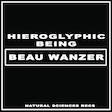 Can’t think of a better pair of ambassadors from Chicago, brought together for the first time care of Manchester’s Natural Sciences. Smart move! Beau Wanzer found his lane almost ten years ago now and he’s stuck to it faithfully ever since: absolutely filthy downtempo analog grooves, cuts as creepy and murky as they are oddball and entertaining. Hieroglyphic Being (aka Jamal Moss) is far too vast of an entity to properly describe in a couple sentences, but keeping that in mind, I will say he’s been a Chicago dance institution since the mid ’00s, reaping countless collaborations, projects and mixes from the halcyon days of cheap CD-r duplication through to the present. Really nice to see them together here, and both of their cuts deliver the proper goods. Wanzer’s “The Table Scrap” is as molten and corrosive as ever, deftly adjusted in real-time and enhanced by some gnarly vocals, as inscrutable as they are appropriate to the mix. Moss comes forward with the incredibly titled “This is the Right Time in Human History 2 Be Stupid”, which continues his meditation on digital mainframes as psychedelic pathways. His groove is hypnotic and shifty, reminiscent of Morphosis (though really just sounding, as always, like himself). Two killer and lengthy tracks on what very well might be my favorite split twelve-inch of 2022.
Can’t think of a better pair of ambassadors from Chicago, brought together for the first time care of Manchester’s Natural Sciences. Smart move! Beau Wanzer found his lane almost ten years ago now and he’s stuck to it faithfully ever since: absolutely filthy downtempo analog grooves, cuts as creepy and murky as they are oddball and entertaining. Hieroglyphic Being (aka Jamal Moss) is far too vast of an entity to properly describe in a couple sentences, but keeping that in mind, I will say he’s been a Chicago dance institution since the mid ’00s, reaping countless collaborations, projects and mixes from the halcyon days of cheap CD-r duplication through to the present. Really nice to see them together here, and both of their cuts deliver the proper goods. Wanzer’s “The Table Scrap” is as molten and corrosive as ever, deftly adjusted in real-time and enhanced by some gnarly vocals, as inscrutable as they are appropriate to the mix. Moss comes forward with the incredibly titled “This is the Right Time in Human History 2 Be Stupid”, which continues his meditation on digital mainframes as psychedelic pathways. His groove is hypnotic and shifty, reminiscent of Morphosis (though really just sounding, as always, like himself). Two killer and lengthy tracks on what very well might be my favorite split twelve-inch of 2022.
Why Bother? Lacerated Nights LP (Feel It)
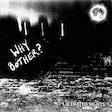 Iowa’s Why Bother? follow their 2021 Feel It debut with Lacerated Nights, which I presume for them means those times when you’re running home through a cow pasture at night and accidentally catch your leg on a barbed-wire fence. Much like their unusual location for a record-releasing punk band, their sound isn’t overly formulaic, albeit unquestionably punk in design and practice. The songs here continue the haunted-house punk sound they previously established for themselves, not necessarily building on it so much as writing more songs in that same style, and it works for me. They’ve got a Misfits-indebted songwriting technique apparent in some of these tunes (ie. spooky choruses you can shout along with), and a particularly Spits-like sound in the way the songs cut through the speakers. Why Bother? strike me as less nihilistic / personally unhappy as The Spits though, and they even get a little tuneful in a post-punky way on occasion, sounding less like a VG copy of the Meaty Buys seven-inch and more like, I dunno, one of those early Blank Dogs singles (before the magic was gone). Even when tuneful and less aggressive, there’s no dressing up Why Bother? for a handsome senior picture – this sorta lo-fi heartland punk rock will never be accepted by the mainstream, and I applaud them for their contributions.
Iowa’s Why Bother? follow their 2021 Feel It debut with Lacerated Nights, which I presume for them means those times when you’re running home through a cow pasture at night and accidentally catch your leg on a barbed-wire fence. Much like their unusual location for a record-releasing punk band, their sound isn’t overly formulaic, albeit unquestionably punk in design and practice. The songs here continue the haunted-house punk sound they previously established for themselves, not necessarily building on it so much as writing more songs in that same style, and it works for me. They’ve got a Misfits-indebted songwriting technique apparent in some of these tunes (ie. spooky choruses you can shout along with), and a particularly Spits-like sound in the way the songs cut through the speakers. Why Bother? strike me as less nihilistic / personally unhappy as The Spits though, and they even get a little tuneful in a post-punky way on occasion, sounding less like a VG copy of the Meaty Buys seven-inch and more like, I dunno, one of those early Blank Dogs singles (before the magic was gone). Even when tuneful and less aggressive, there’s no dressing up Why Bother? for a handsome senior picture – this sorta lo-fi heartland punk rock will never be accepted by the mainstream, and I applaud them for their contributions.

